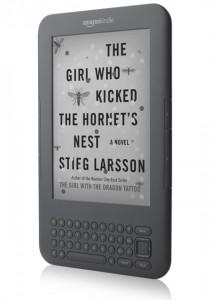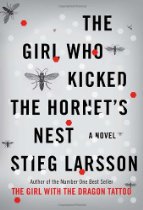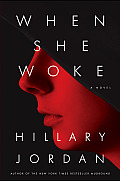Thu 15 Sep 2011
 Update 10/18/2011: Finally, a publisher (other than Baen) that is bundling a free ebook version with the hardcover! See When She Woke (Includes Free eBook) by Hillary Jordan at Powell’s Books in Portland. I’m not interested in this particular book myself (mainly due to the pro- “choice” bias towards abortion), but I find the bundling of an ebook copy a wonderful practice! I just wish it were a better poster child. But, it’s a start.
Update 10/18/2011: Finally, a publisher (other than Baen) that is bundling a free ebook version with the hardcover! See When She Woke (Includes Free eBook) by Hillary Jordan at Powell’s Books in Portland. I’m not interested in this particular book myself (mainly due to the pro- “choice” bias towards abortion), but I find the bundling of an ebook copy a wonderful practice! I just wish it were a better poster child. But, it’s a start.
I’ve thought for years now that it would be a great business practice to give a customer a free electronic version of any book they purchase in physical form (say, hardcover). The logistics of getting the ebook into the hands of the customer would have to be worked out, but it’s not a technical problem. I guess most publishers think (erroneously) that doing this would result in more piracy, or more accurately, in lower revenues. I hope the publishing industry as a whole figures out that this is a fallacy and they implement the practice of bundling ebooks.

Seriously: you buy a hardcover, and you get a code to download the ebook version. Do they really think this would add to book piracy? It is trivially easy to remove the DRM (Digital Rights Management, i.e., copy protection) from a purchased ebook. Once DRM is removed, an unscrupulous person could then put the book up on “sharing” (pirating) sites and make it available to anyone with an internet connection. I’d venture a guess that most (popular) books can be found on such sites.
If this were a real problem for the industry, would we have seen:
In the first five months of this year sales of consumer e-books in America overtook those from adult hardback books. Just a year earlier hardbacks had been worth more than three times as much as e-books, according to the Association of American Publishers. Amazon now sells more copies of e-books than paper books.
-“Great Digital Expectations” in The Economist, Sept 2011
This is no more a (real) problem than music-sharing (again, pirating) sites: Apple’s iTunes music store is hugely popular, and millions of people *buy* music there. Pirated music is a very small subset, and I’m not convinced that music piracy has lowered revenues to any significant extent. I’d have to say that ebook piracy would be an even smaller subset of the Book industry.
Baen Books (a great Science Fiction publisher) already does this. For example, many of the recent books in the Honor Harrington series by David Weber include a CDROM in the hardcover. The CD has ebook versions of the current book as well as all the other books in the series and related books by other authors. AND none of the content is copy-protected. Obviously, if piracy were an issue they would have stopped this practice. As a matter of fact, they encourage you to share the content! They figure it will ultimately lead to more readers actually buying Baen books. I know I do! They also have a “Free Library” where you can download free books. If only the rest of the industry would embrace such practices!
There’s an interesting article in The Economist on the transformation of the publishing industry, “Disappearing Ink“. Seems the Movie industry was also worried about piracy (hah!), so they have started including versions of movies, etc. that you can download (for your iDevice or computer) when you purchase a DVD (see my emphasis):
They are doing some things right. Having watched the record companies’ impotence after Apple wrested control of music-pricing from them, the publishers have managed to retain their ability to set prices. But they are missing some tricks. The music and film industries have started to bundle electronic with physical versions of their products—by, for instance, providing those who buy a DVD of a movie with a code to download it from the internet. Publishers, similarly, should bundle e-books with paper books.
-“Disappearing Ink” in The Economist, Sept. 2011
I’m a lover (and collector) of physical books; no iDevice will ever provide the same tactile experience as curling up in a comfy chair with a real, nicely produced Book. The Kindle does the best job of mimicking paper, and is the best eReader in that respect, but it still doesn’t “feel” like a book. That being said, I am also an avid *reader*, and no physical book is going to be as ever-present with me as my iDevice or Kindle. It is just so convenient to have a whole library with you wherever you go – and to have all your reading notes, bookmarks, etc. follow you in the cloud.
I love eBooks too. Don’t make me choose!




September 16th, 2011 at 9:50 am
A couple of things:
1. Many of the avid ebook fans have created “book ripping” setups using digital cameras and OCR software that quickly produc ebooks. It ultimately doesn’t matter what the publishers do – the ebooks will be out there anyway. They might as well be magnanimous about it and garner the positive PR. Or they can continue being jerks and when they start going belly up we’ll just sit back and laugh at them.
2. I love Baen entirely because of their ebook policies. One of my life goals it to be a published author and nothing would please me more than to be published by Baen.
3. Because of the “please share this disk” philosophy surrounding the Baen CDs, they are easily available even without buying the hardback. You can (legally!!) get them via bit torrent or from this web site:
http://baencd.thefifthimperium.com/
If you’re in the mood for some humor, click the link for “Claws That Catch” and read John Ringo’s message. Save the puppy!
September 16th, 2011 at 10:06 am
I’m not sure how many people really want both versions, John. I suspect you are in a small minority.
My problem is that I need to stop acquiring hard-copy books. My house has run out of space! My main goal would be to get the e-books down to a reasonable price. I would really like to see how much the publishers save by not publishing in hard copy; my gut feel is that the prices could be significantly lower & that the publishers are ripping us off because they think ebook buyers are price-insensitive.
September 16th, 2011 at 10:29 am
Hi Don:
Thanks for pointing out the link to John Ringo’s message. I got a good chuckle! :)
I do realize you can *find* e-versions of most books online (I look :) ). Legal issues aside, I don’t see any real ethical issue to downloading such versions if I have already paid for a copy (hardcopy or not). But these unauthorized repositories do have some drawbacks:
– how can I be sure that the content is really the same as the published book? I can’t think of a valid reason why it would intentionally be different, but…
– if the content is up without the author’s (or publisher’s) consent, then the author will not be getting royalties. Authors should be paid for their art! That’s why I really want an authorized e-copy provided when I *buy* a book. :)
Bean is definitely a publisher who gets it. Why don’t the others? Are SF fans just inherently more honest, so Baen doesn’t worry? :)
September 16th, 2011 at 10:33 am
Hi Angie:
I do hope I’m not in the minority, but I suspect you are correct. Perhaps that’s why the publishers haven’t yet had a good incentive?
I haven’t yet figured out how to get an author to sign my Ebook, though I did get one to sign my iPad:
http://www.hoodedhawk.com/blog/2011/05/24/arthur-phillips-the-tragedy-of-arthur/
And yep, I’ve run out of space a number of times, or so I thought. Then I’d find another place for a bookshelf. But now I think I’m out of room for real. I’ve got a bit over 2000 volumes, but only a few more feet of shelfspace left. Bummer!